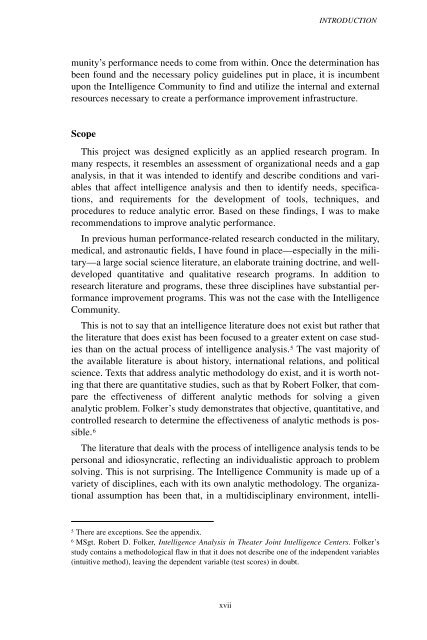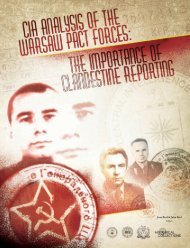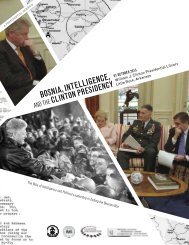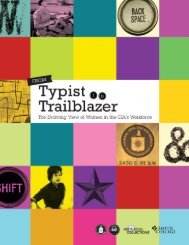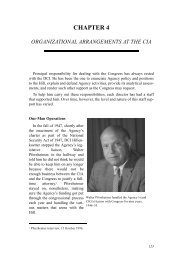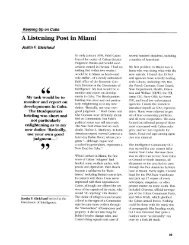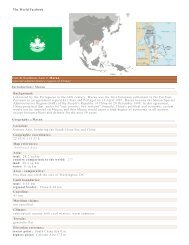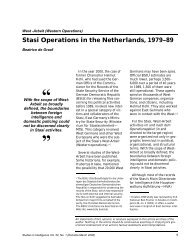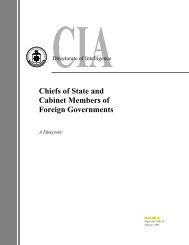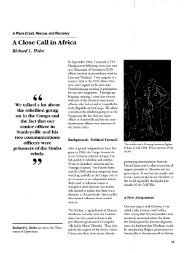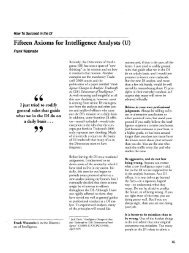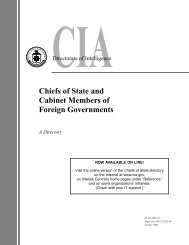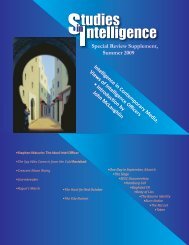Analytic Culture in the U.S. Intelligence Community (PDF) - CIA
Analytic Culture in the U.S. Intelligence Community (PDF) - CIA
Analytic Culture in the U.S. Intelligence Community (PDF) - CIA
You also want an ePaper? Increase the reach of your titles
YUMPU automatically turns print PDFs into web optimized ePapers that Google loves.
INTRODUCTION<br />
munity’s performance needs to come from with<strong>in</strong>. Once <strong>the</strong> determ<strong>in</strong>ation has<br />
been found and <strong>the</strong> necessary policy guidel<strong>in</strong>es put <strong>in</strong> place, it is <strong>in</strong>cumbent<br />
upon <strong>the</strong> <strong>Intelligence</strong> <strong>Community</strong> to f<strong>in</strong>d and utilize <strong>the</strong> <strong>in</strong>ternal and external<br />
resources necessary to create a performance improvement <strong>in</strong>frastructure.<br />
Scope<br />
This project was designed explicitly as an applied research program. In<br />
many respects, it resembles an assessment of organizational needs and a gap<br />
analysis, <strong>in</strong> that it was <strong>in</strong>tended to identify and describe conditions and variables<br />
that affect <strong>in</strong>telligence analysis and <strong>the</strong>n to identify needs, specifications,<br />
and requirements for <strong>the</strong> development of tools, techniques, and<br />
procedures to reduce analytic error. Based on <strong>the</strong>se f<strong>in</strong>d<strong>in</strong>gs, I was to make<br />
recommendations to improve analytic performance.<br />
In previous human performance-related research conducted <strong>in</strong> <strong>the</strong> military,<br />
medical, and astronautic fields, I have found <strong>in</strong> place—especially <strong>in</strong> <strong>the</strong> military—a<br />
large social science literature, an elaborate tra<strong>in</strong><strong>in</strong>g doctr<strong>in</strong>e, and welldeveloped<br />
quantitative and qualitative research programs. In addition to<br />
research literature and programs, <strong>the</strong>se three discipl<strong>in</strong>es have substantial performance<br />
improvement programs. This was not <strong>the</strong> case with <strong>the</strong> <strong>Intelligence</strong><br />
<strong>Community</strong>.<br />
This is not to say that an <strong>in</strong>telligence literature does not exist but ra<strong>the</strong>r that<br />
<strong>the</strong> literature that does exist has been focused to a greater extent on case studies<br />
than on <strong>the</strong> actual process of <strong>in</strong>telligence analysis. 5 The vast majority of<br />
<strong>the</strong> available literature is about history, <strong>in</strong>ternational relations, and political<br />
science. Texts that address analytic methodology do exist, and it is worth not<strong>in</strong>g<br />
that <strong>the</strong>re are quantitative studies, such as that by Robert Folker, that compare<br />
<strong>the</strong> effectiveness of different analytic methods for solv<strong>in</strong>g a given<br />
analytic problem. Folker’s study demonstrates that objective, quantitative, and<br />
controlled research to determ<strong>in</strong>e <strong>the</strong> effectiveness of analytic methods is possible.<br />
6<br />
The literature that deals with <strong>the</strong> process of <strong>in</strong>telligence analysis tends to be<br />
personal and idiosyncratic, reflect<strong>in</strong>g an <strong>in</strong>dividualistic approach to problem<br />
solv<strong>in</strong>g. This is not surpris<strong>in</strong>g. The <strong>Intelligence</strong> <strong>Community</strong> is made up of a<br />
variety of discipl<strong>in</strong>es, each with its own analytic methodology. The organizational<br />
assumption has been that, <strong>in</strong> a multidiscipl<strong>in</strong>ary environment, <strong>in</strong>telli-<br />
5<br />
There are exceptions. See <strong>the</strong> appendix.<br />
6<br />
MSgt. Robert D. Folker, <strong>Intelligence</strong> Analysis <strong>in</strong> Theater Jo<strong>in</strong>t <strong>Intelligence</strong> Centers. Folker’s<br />
study conta<strong>in</strong>s a methodological flaw <strong>in</strong> that it does not describe one of <strong>the</strong> <strong>in</strong>dependent variables<br />
(<strong>in</strong>tuitive method), leav<strong>in</strong>g <strong>the</strong> dependent variable (test scores) <strong>in</strong> doubt.<br />
xvii


